Brain Drain Impact on Human Capital in Malaysia
VerifiedAdded on 2019/09/16
|13
|3609
|330
Report
AI Summary
This report examines the impact of brain drain on human capital in Malaysia. It defines brain drain as the emigration of highly skilled individuals and explores its causes, including economic factors, lack of opportunities, and social injustice. The report analyzes the magnitude of the Malaysian diaspora, particularly in Singapore, and discusses the skill intensity of migration to various destinations. It delves into the push and pull factors driving emigration, such as salary disparities, career prospects, and quality of life. The economic consequences of brain drain are explored, including its effect on the skill composition of the domestic workforce and the potential for reduced innovation and productivity. The report also considers the advantages of brain drain, such as remittances and the transfer of liberal values, alongside its disadvantages, including skill shortages and social marginalization. Finally, it outlines approaches to mitigate brain drain, such as addressing social injustices, improving infrastructure, and providing better job opportunities.
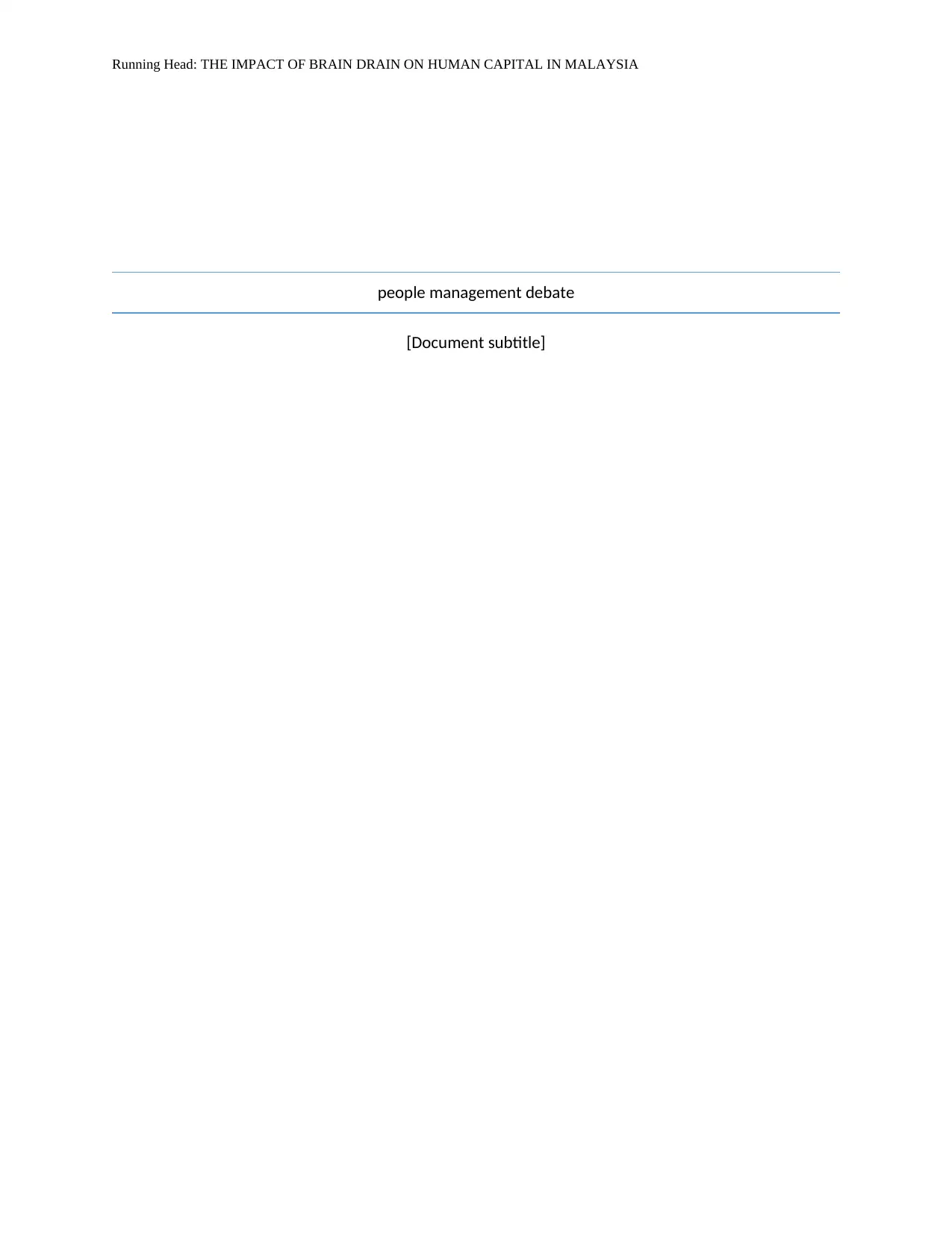
Running Head: THE IMPACT OF BRAIN DRAIN ON HUMAN CAPITAL IN MALAYSIA
people management debate
[Document subtitle]
people management debate
[Document subtitle]
Paraphrase This Document
Need a fresh take? Get an instant paraphrase of this document with our AI Paraphraser
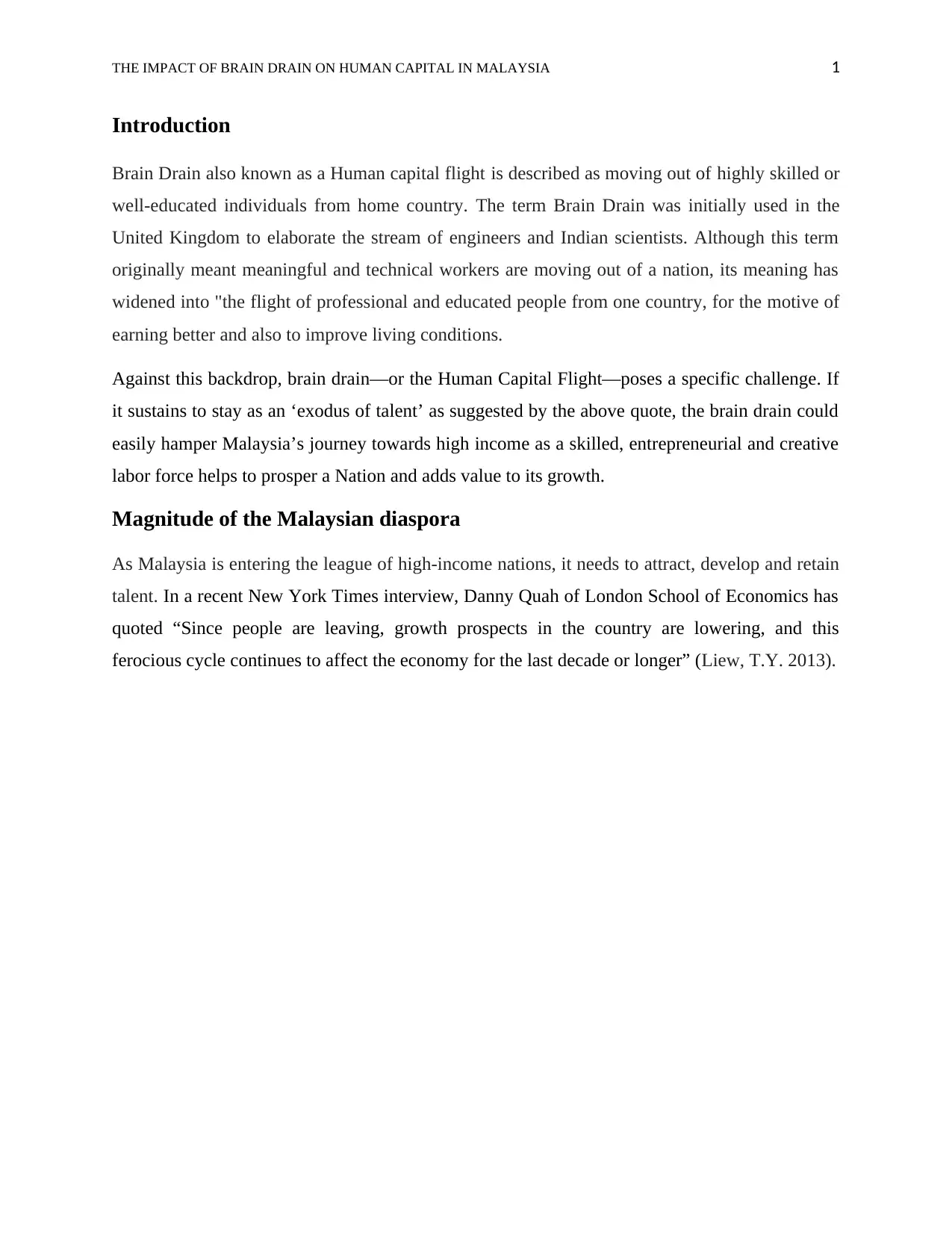
THE IMPACT OF BRAIN DRAIN ON HUMAN CAPITAL IN MALAYSIA 1
Introduction
Brain Drain also known as a Human capital flight is described as moving out of highly skilled or
well-educated individuals from home country. The term Brain Drain was initially used in the
United Kingdom to elaborate the stream of engineers and Indian scientists. Although this term
originally meant meaningful and technical workers are moving out of a nation, its meaning has
widened into "the flight of professional and educated people from one country, for the motive of
earning better and also to improve living conditions.
Against this backdrop, brain drain—or the Human Capital Flight—poses a specific challenge. If
it sustains to stay as an ‘exodus of talent’ as suggested by the above quote, the brain drain could
easily hamper Malaysia’s journey towards high income as a skilled, entrepreneurial and creative
labor force helps to prosper a Nation and adds value to its growth.
Magnitude of the Malaysian diaspora
As Malaysia is entering the league of high-income nations, it needs to attract, develop and retain
talent. In a recent New York Times interview, Danny Quah of London School of Economics has
quoted “Since people are leaving, growth prospects in the country are lowering, and this
ferocious cycle continues to affect the economy for the last decade or longer” (Liew, T.Y. 2013).
Introduction
Brain Drain also known as a Human capital flight is described as moving out of highly skilled or
well-educated individuals from home country. The term Brain Drain was initially used in the
United Kingdom to elaborate the stream of engineers and Indian scientists. Although this term
originally meant meaningful and technical workers are moving out of a nation, its meaning has
widened into "the flight of professional and educated people from one country, for the motive of
earning better and also to improve living conditions.
Against this backdrop, brain drain—or the Human Capital Flight—poses a specific challenge. If
it sustains to stay as an ‘exodus of talent’ as suggested by the above quote, the brain drain could
easily hamper Malaysia’s journey towards high income as a skilled, entrepreneurial and creative
labor force helps to prosper a Nation and adds value to its growth.
Magnitude of the Malaysian diaspora
As Malaysia is entering the league of high-income nations, it needs to attract, develop and retain
talent. In a recent New York Times interview, Danny Quah of London School of Economics has
quoted “Since people are leaving, growth prospects in the country are lowering, and this
ferocious cycle continues to affect the economy for the last decade or longer” (Liew, T.Y. 2013).
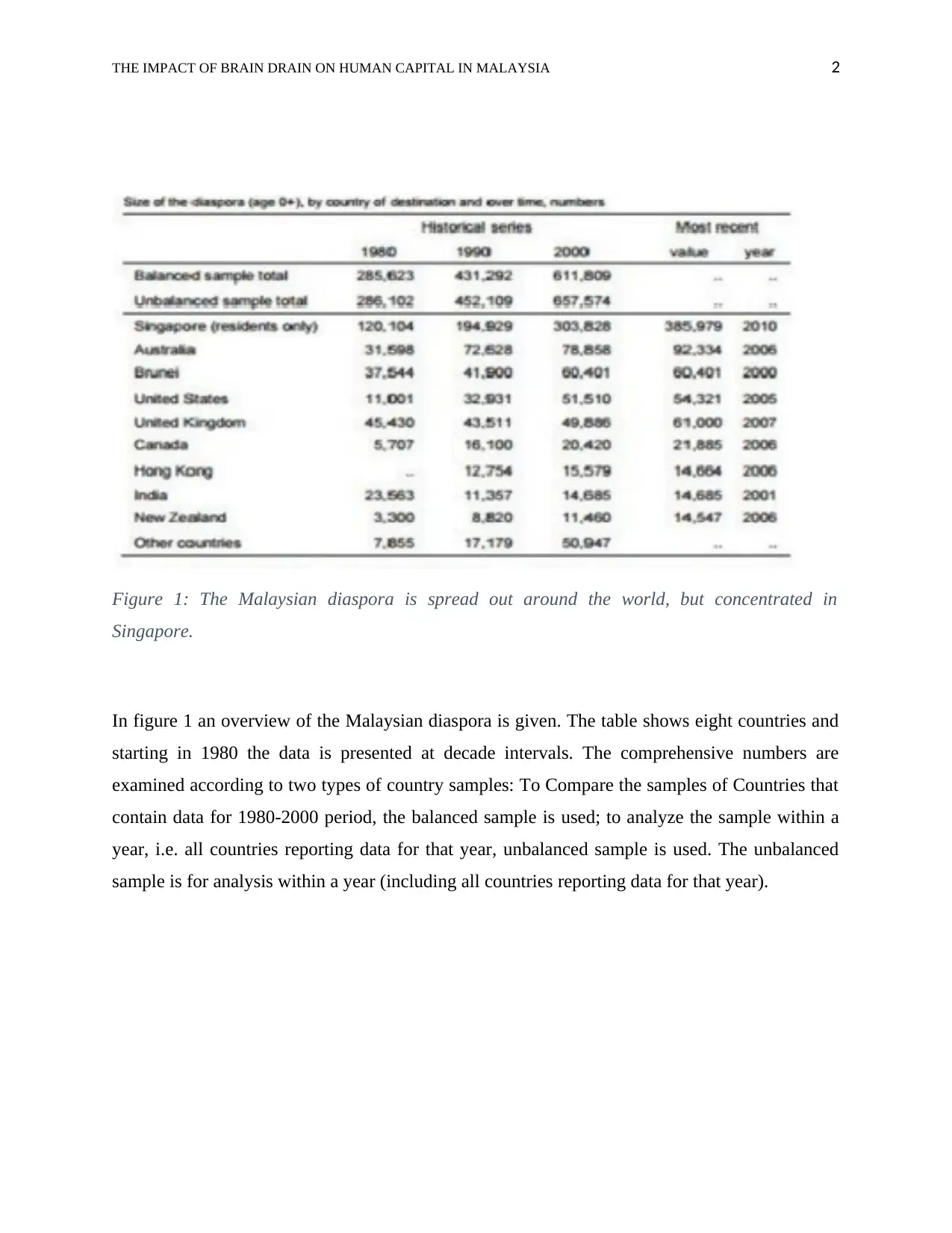
THE IMPACT OF BRAIN DRAIN ON HUMAN CAPITAL IN MALAYSIA 2
Figure 1: The Malaysian diaspora is spread out around the world, but concentrated in
Singapore.
In figure 1 an overview of the Malaysian diaspora is given. The table shows eight countries and
starting in 1980 the data is presented at decade intervals. The comprehensive numbers are
examined according to two types of country samples: To Compare the samples of Countries that
contain data for 1980-2000 period, the balanced sample is used; to analyze the sample within a
year, i.e. all countries reporting data for that year, unbalanced sample is used. The unbalanced
sample is for analysis within a year (including all countries reporting data for that year).
Figure 1: The Malaysian diaspora is spread out around the world, but concentrated in
Singapore.
In figure 1 an overview of the Malaysian diaspora is given. The table shows eight countries and
starting in 1980 the data is presented at decade intervals. The comprehensive numbers are
examined according to two types of country samples: To Compare the samples of Countries that
contain data for 1980-2000 period, the balanced sample is used; to analyze the sample within a
year, i.e. all countries reporting data for that year, unbalanced sample is used. The unbalanced
sample is for analysis within a year (including all countries reporting data for that year).
⊘ This is a preview!⊘
Do you want full access?
Subscribe today to unlock all pages.

Trusted by 1+ million students worldwide
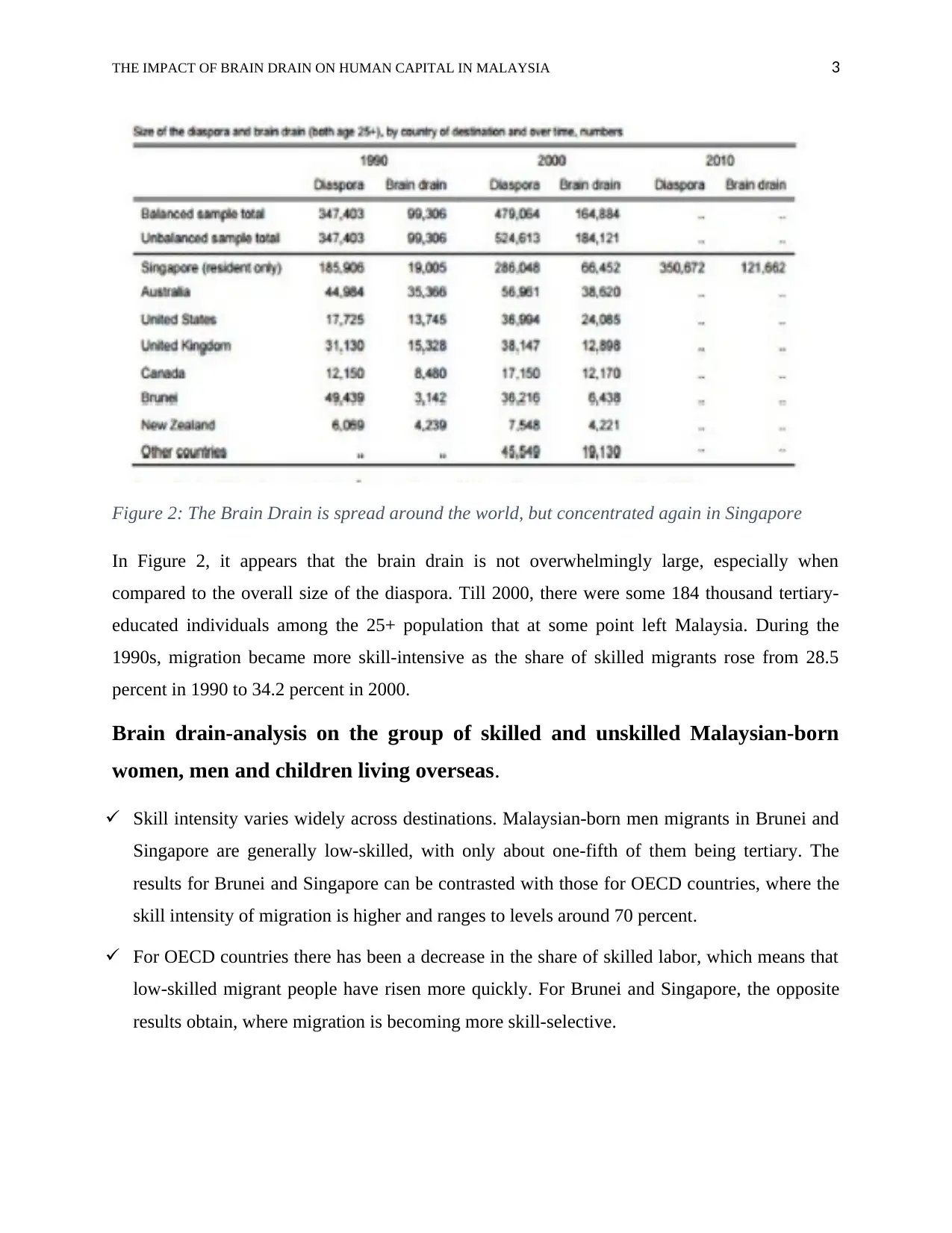
THE IMPACT OF BRAIN DRAIN ON HUMAN CAPITAL IN MALAYSIA 3
Figure 2: The Brain Drain is spread around the world, but concentrated again in Singapore
In Figure 2, it appears that the brain drain is not overwhelmingly large, especially when
compared to the overall size of the diaspora. Till 2000, there were some 184 thousand tertiary-
educated individuals among the 25+ population that at some point left Malaysia. During the
1990s, migration became more skill-intensive as the share of skilled migrants rose from 28.5
percent in 1990 to 34.2 percent in 2000.
Brain drain-analysis on the group of skilled and unskilled Malaysian-born
women, men and children living overseas.
Skill intensity varies widely across destinations. Malaysian-born men migrants in Brunei and
Singapore are generally low-skilled, with only about one-fifth of them being tertiary. The
results for Brunei and Singapore can be contrasted with those for OECD countries, where the
skill intensity of migration is higher and ranges to levels around 70 percent.
For OECD countries there has been a decrease in the share of skilled labor, which means that
low-skilled migrant people have risen more quickly. For Brunei and Singapore, the opposite
results obtain, where migration is becoming more skill-selective.
Figure 2: The Brain Drain is spread around the world, but concentrated again in Singapore
In Figure 2, it appears that the brain drain is not overwhelmingly large, especially when
compared to the overall size of the diaspora. Till 2000, there were some 184 thousand tertiary-
educated individuals among the 25+ population that at some point left Malaysia. During the
1990s, migration became more skill-intensive as the share of skilled migrants rose from 28.5
percent in 1990 to 34.2 percent in 2000.
Brain drain-analysis on the group of skilled and unskilled Malaysian-born
women, men and children living overseas.
Skill intensity varies widely across destinations. Malaysian-born men migrants in Brunei and
Singapore are generally low-skilled, with only about one-fifth of them being tertiary. The
results for Brunei and Singapore can be contrasted with those for OECD countries, where the
skill intensity of migration is higher and ranges to levels around 70 percent.
For OECD countries there has been a decrease in the share of skilled labor, which means that
low-skilled migrant people have risen more quickly. For Brunei and Singapore, the opposite
results obtain, where migration is becoming more skill-selective.
Paraphrase This Document
Need a fresh take? Get an instant paraphrase of this document with our AI Paraphraser
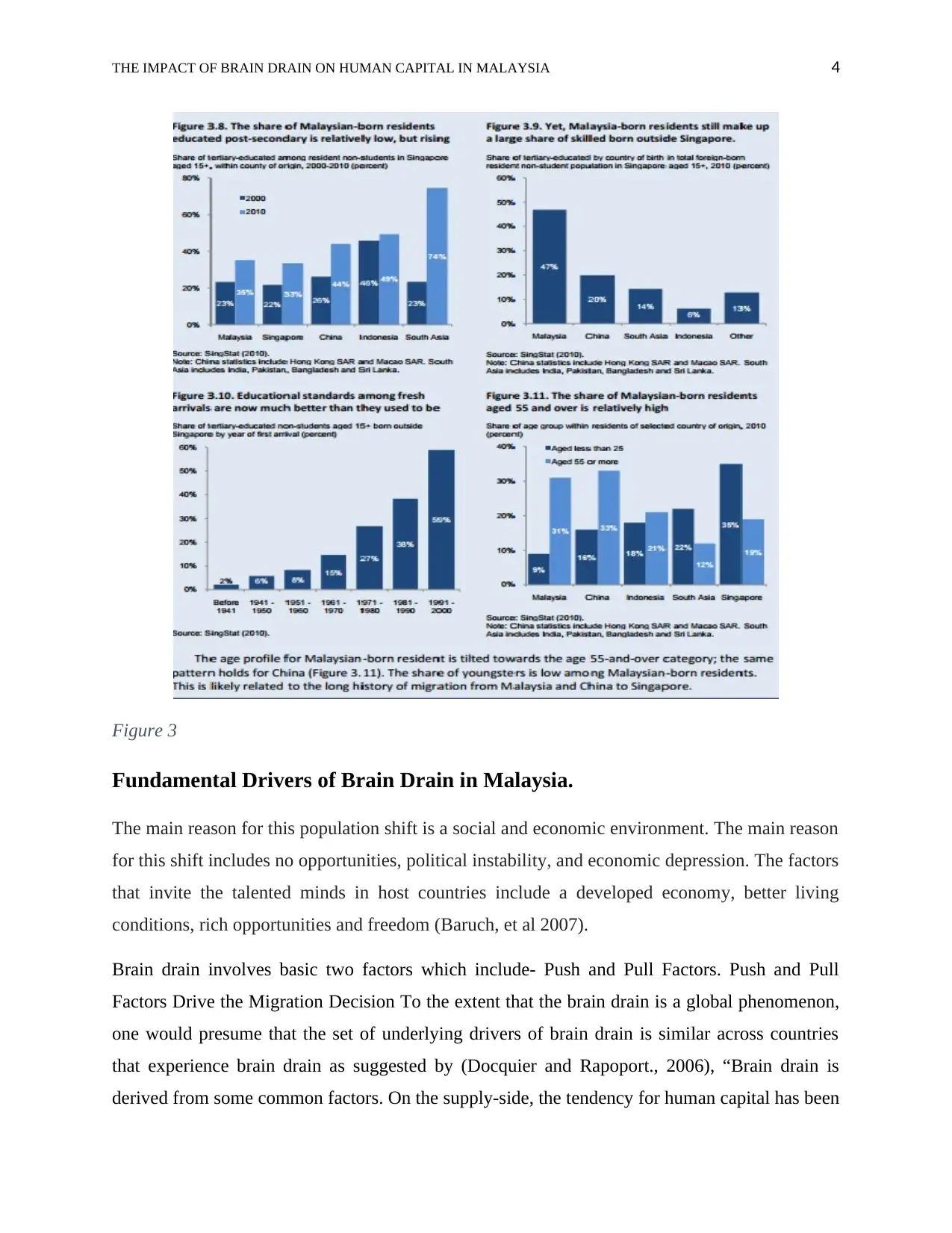
THE IMPACT OF BRAIN DRAIN ON HUMAN CAPITAL IN MALAYSIA 4
Figure 3
Fundamental Drivers of Brain Drain in Malaysia.
The main reason for this population shift is a social and economic environment. The main reason
for this shift includes no opportunities, political instability, and economic depression. The factors
that invite the talented minds in host countries include a developed economy, better living
conditions, rich opportunities and freedom (Baruch, et al 2007).
Brain drain involves basic two factors which include- Push and Pull Factors. Push and Pull
Factors Drive the Migration Decision To the extent that the brain drain is a global phenomenon,
one would presume that the set of underlying drivers of brain drain is similar across countries
that experience brain drain as suggested by (Docquier and Rapoport., 2006), “Brain drain is
derived from some common factors. On the supply-side, the tendency for human capital has been
Figure 3
Fundamental Drivers of Brain Drain in Malaysia.
The main reason for this population shift is a social and economic environment. The main reason
for this shift includes no opportunities, political instability, and economic depression. The factors
that invite the talented minds in host countries include a developed economy, better living
conditions, rich opportunities and freedom (Baruch, et al 2007).
Brain drain involves basic two factors which include- Push and Pull Factors. Push and Pull
Factors Drive the Migration Decision To the extent that the brain drain is a global phenomenon,
one would presume that the set of underlying drivers of brain drain is similar across countries
that experience brain drain as suggested by (Docquier and Rapoport., 2006), “Brain drain is
derived from some common factors. On the supply-side, the tendency for human capital has been
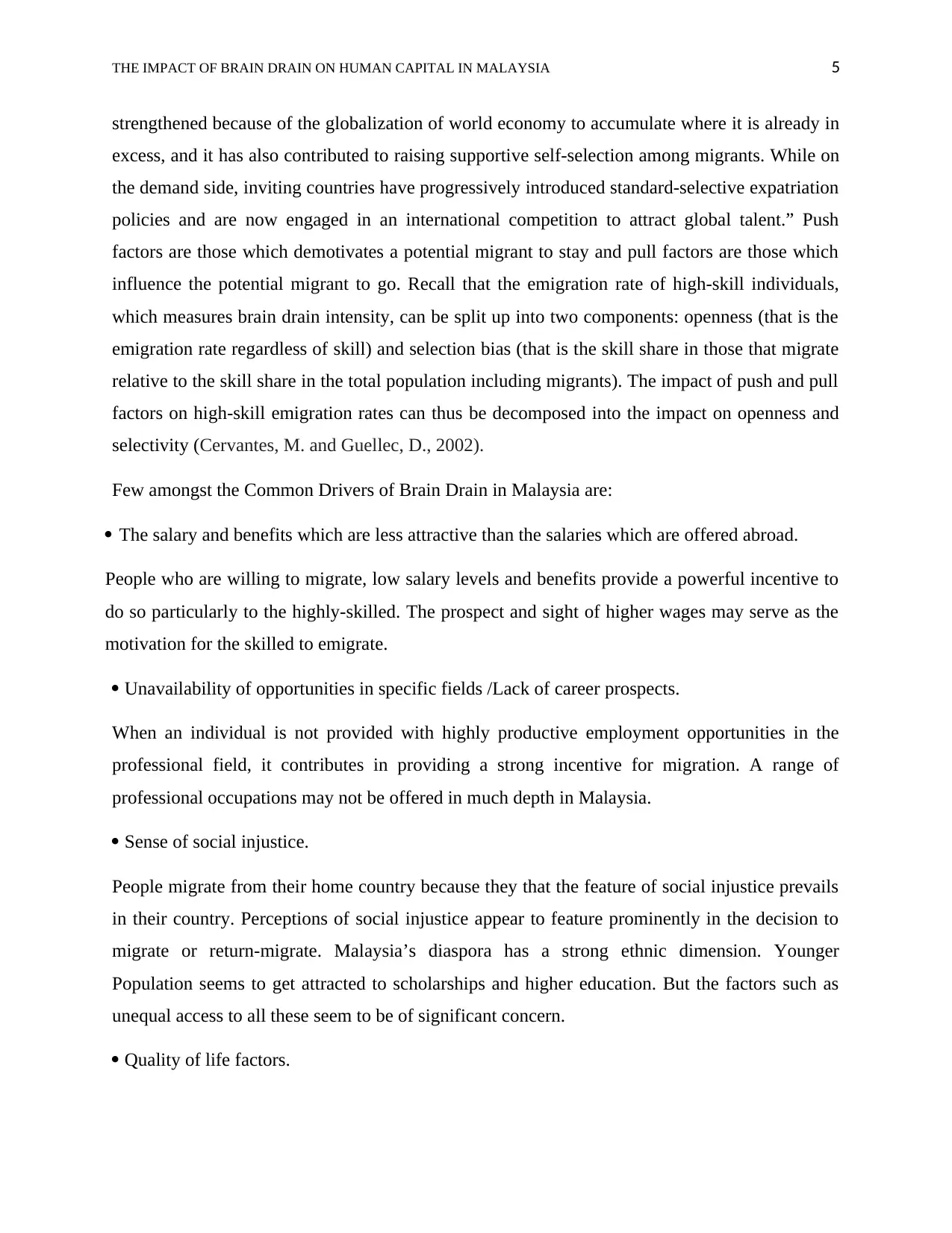
THE IMPACT OF BRAIN DRAIN ON HUMAN CAPITAL IN MALAYSIA 5
strengthened because of the globalization of world economy to accumulate where it is already in
excess, and it has also contributed to raising supportive self-selection among migrants. While on
the demand side, inviting countries have progressively introduced standard-selective expatriation
policies and are now engaged in an international competition to attract global talent.” Push
factors are those which demotivates a potential migrant to stay and pull factors are those which
influence the potential migrant to go. Recall that the emigration rate of high-skill individuals,
which measures brain drain intensity, can be split up into two components: openness (that is the
emigration rate regardless of skill) and selection bias (that is the skill share in those that migrate
relative to the skill share in the total population including migrants). The impact of push and pull
factors on high-skill emigration rates can thus be decomposed into the impact on openness and
selectivity (Cervantes, M. and Guellec, D., 2002).
Few amongst the Common Drivers of Brain Drain in Malaysia are:
The salary and benefits which are less attractive than the salaries which are offered abroad.
People who are willing to migrate, low salary levels and benefits provide a powerful incentive to
do so particularly to the highly-skilled. The prospect and sight of higher wages may serve as the
motivation for the skilled to emigrate.
Unavailability of opportunities in specific fields /Lack of career prospects.
When an individual is not provided with highly productive employment opportunities in the
professional field, it contributes in providing a strong incentive for migration. A range of
professional occupations may not be offered in much depth in Malaysia.
Sense of social injustice.
People migrate from their home country because they that the feature of social injustice prevails
in their country. Perceptions of social injustice appear to feature prominently in the decision to
migrate or return-migrate. Malaysia’s diaspora has a strong ethnic dimension. Younger
Population seems to get attracted to scholarships and higher education. But the factors such as
unequal access to all these seem to be of significant concern.
Quality of life factors.
strengthened because of the globalization of world economy to accumulate where it is already in
excess, and it has also contributed to raising supportive self-selection among migrants. While on
the demand side, inviting countries have progressively introduced standard-selective expatriation
policies and are now engaged in an international competition to attract global talent.” Push
factors are those which demotivates a potential migrant to stay and pull factors are those which
influence the potential migrant to go. Recall that the emigration rate of high-skill individuals,
which measures brain drain intensity, can be split up into two components: openness (that is the
emigration rate regardless of skill) and selection bias (that is the skill share in those that migrate
relative to the skill share in the total population including migrants). The impact of push and pull
factors on high-skill emigration rates can thus be decomposed into the impact on openness and
selectivity (Cervantes, M. and Guellec, D., 2002).
Few amongst the Common Drivers of Brain Drain in Malaysia are:
The salary and benefits which are less attractive than the salaries which are offered abroad.
People who are willing to migrate, low salary levels and benefits provide a powerful incentive to
do so particularly to the highly-skilled. The prospect and sight of higher wages may serve as the
motivation for the skilled to emigrate.
Unavailability of opportunities in specific fields /Lack of career prospects.
When an individual is not provided with highly productive employment opportunities in the
professional field, it contributes in providing a strong incentive for migration. A range of
professional occupations may not be offered in much depth in Malaysia.
Sense of social injustice.
People migrate from their home country because they that the feature of social injustice prevails
in their country. Perceptions of social injustice appear to feature prominently in the decision to
migrate or return-migrate. Malaysia’s diaspora has a strong ethnic dimension. Younger
Population seems to get attracted to scholarships and higher education. But the factors such as
unequal access to all these seem to be of significant concern.
Quality of life factors.
⊘ This is a preview!⊘
Do you want full access?
Subscribe today to unlock all pages.

Trusted by 1+ million students worldwide
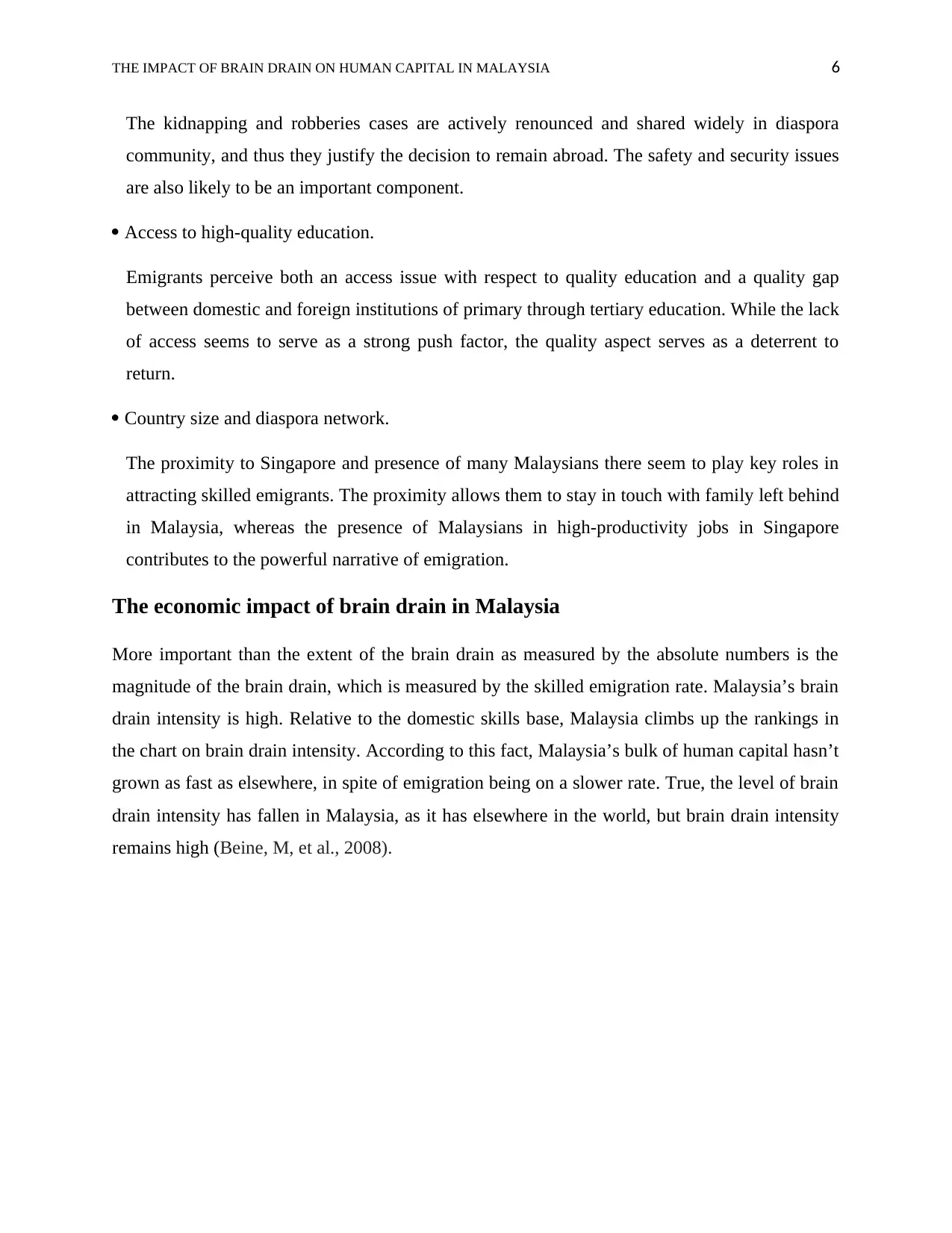
THE IMPACT OF BRAIN DRAIN ON HUMAN CAPITAL IN MALAYSIA 6
The kidnapping and robberies cases are actively renounced and shared widely in diaspora
community, and thus they justify the decision to remain abroad. The safety and security issues
are also likely to be an important component.
Access to high-quality education.
Emigrants perceive both an access issue with respect to quality education and a quality gap
between domestic and foreign institutions of primary through tertiary education. While the lack
of access seems to serve as a strong push factor, the quality aspect serves as a deterrent to
return.
Country size and diaspora network.
The proximity to Singapore and presence of many Malaysians there seem to play key roles in
attracting skilled emigrants. The proximity allows them to stay in touch with family left behind
in Malaysia, whereas the presence of Malaysians in high-productivity jobs in Singapore
contributes to the powerful narrative of emigration.
The economic impact of brain drain in Malaysia
More important than the extent of the brain drain as measured by the absolute numbers is the
magnitude of the brain drain, which is measured by the skilled emigration rate. Malaysia’s brain
drain intensity is high. Relative to the domestic skills base, Malaysia climbs up the rankings in
the chart on brain drain intensity. According to this fact, Malaysia’s bulk of human capital hasn’t
grown as fast as elsewhere, in spite of emigration being on a slower rate. True, the level of brain
drain intensity has fallen in Malaysia, as it has elsewhere in the world, but brain drain intensity
remains high (Beine, M, et al., 2008).
The kidnapping and robberies cases are actively renounced and shared widely in diaspora
community, and thus they justify the decision to remain abroad. The safety and security issues
are also likely to be an important component.
Access to high-quality education.
Emigrants perceive both an access issue with respect to quality education and a quality gap
between domestic and foreign institutions of primary through tertiary education. While the lack
of access seems to serve as a strong push factor, the quality aspect serves as a deterrent to
return.
Country size and diaspora network.
The proximity to Singapore and presence of many Malaysians there seem to play key roles in
attracting skilled emigrants. The proximity allows them to stay in touch with family left behind
in Malaysia, whereas the presence of Malaysians in high-productivity jobs in Singapore
contributes to the powerful narrative of emigration.
The economic impact of brain drain in Malaysia
More important than the extent of the brain drain as measured by the absolute numbers is the
magnitude of the brain drain, which is measured by the skilled emigration rate. Malaysia’s brain
drain intensity is high. Relative to the domestic skills base, Malaysia climbs up the rankings in
the chart on brain drain intensity. According to this fact, Malaysia’s bulk of human capital hasn’t
grown as fast as elsewhere, in spite of emigration being on a slower rate. True, the level of brain
drain intensity has fallen in Malaysia, as it has elsewhere in the world, but brain drain intensity
remains high (Beine, M, et al., 2008).
Paraphrase This Document
Need a fresh take? Get an instant paraphrase of this document with our AI Paraphraser
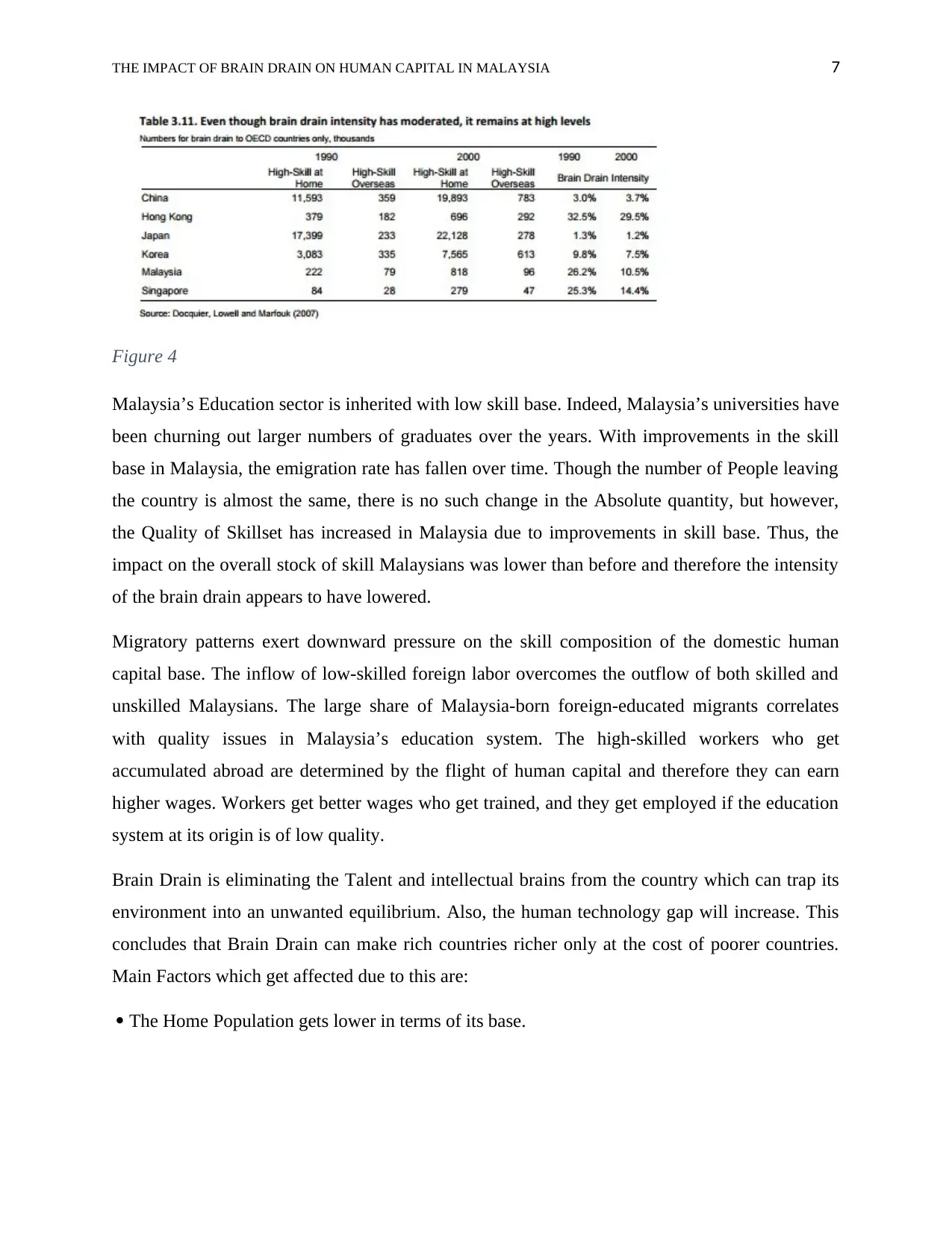
THE IMPACT OF BRAIN DRAIN ON HUMAN CAPITAL IN MALAYSIA 7
Figure 4
Malaysia’s Education sector is inherited with low skill base. Indeed, Malaysia’s universities have
been churning out larger numbers of graduates over the years. With improvements in the skill
base in Malaysia, the emigration rate has fallen over time. Though the number of People leaving
the country is almost the same, there is no such change in the Absolute quantity, but however,
the Quality of Skillset has increased in Malaysia due to improvements in skill base. Thus, the
impact on the overall stock of skill Malaysians was lower than before and therefore the intensity
of the brain drain appears to have lowered.
Migratory patterns exert downward pressure on the skill composition of the domestic human
capital base. The inflow of low-skilled foreign labor overcomes the outflow of both skilled and
unskilled Malaysians. The large share of Malaysia-born foreign-educated migrants correlates
with quality issues in Malaysia’s education system. The high-skilled workers who get
accumulated abroad are determined by the flight of human capital and therefore they can earn
higher wages. Workers get better wages who get trained, and they get employed if the education
system at its origin is of low quality.
Brain Drain is eliminating the Talent and intellectual brains from the country which can trap its
environment into an unwanted equilibrium. Also, the human technology gap will increase. This
concludes that Brain Drain can make rich countries richer only at the cost of poorer countries.
Main Factors which get affected due to this are:
The Home Population gets lower in terms of its base.
Figure 4
Malaysia’s Education sector is inherited with low skill base. Indeed, Malaysia’s universities have
been churning out larger numbers of graduates over the years. With improvements in the skill
base in Malaysia, the emigration rate has fallen over time. Though the number of People leaving
the country is almost the same, there is no such change in the Absolute quantity, but however,
the Quality of Skillset has increased in Malaysia due to improvements in skill base. Thus, the
impact on the overall stock of skill Malaysians was lower than before and therefore the intensity
of the brain drain appears to have lowered.
Migratory patterns exert downward pressure on the skill composition of the domestic human
capital base. The inflow of low-skilled foreign labor overcomes the outflow of both skilled and
unskilled Malaysians. The large share of Malaysia-born foreign-educated migrants correlates
with quality issues in Malaysia’s education system. The high-skilled workers who get
accumulated abroad are determined by the flight of human capital and therefore they can earn
higher wages. Workers get better wages who get trained, and they get employed if the education
system at its origin is of low quality.
Brain Drain is eliminating the Talent and intellectual brains from the country which can trap its
environment into an unwanted equilibrium. Also, the human technology gap will increase. This
concludes that Brain Drain can make rich countries richer only at the cost of poorer countries.
Main Factors which get affected due to this are:
The Home Population gets lower in terms of its base.
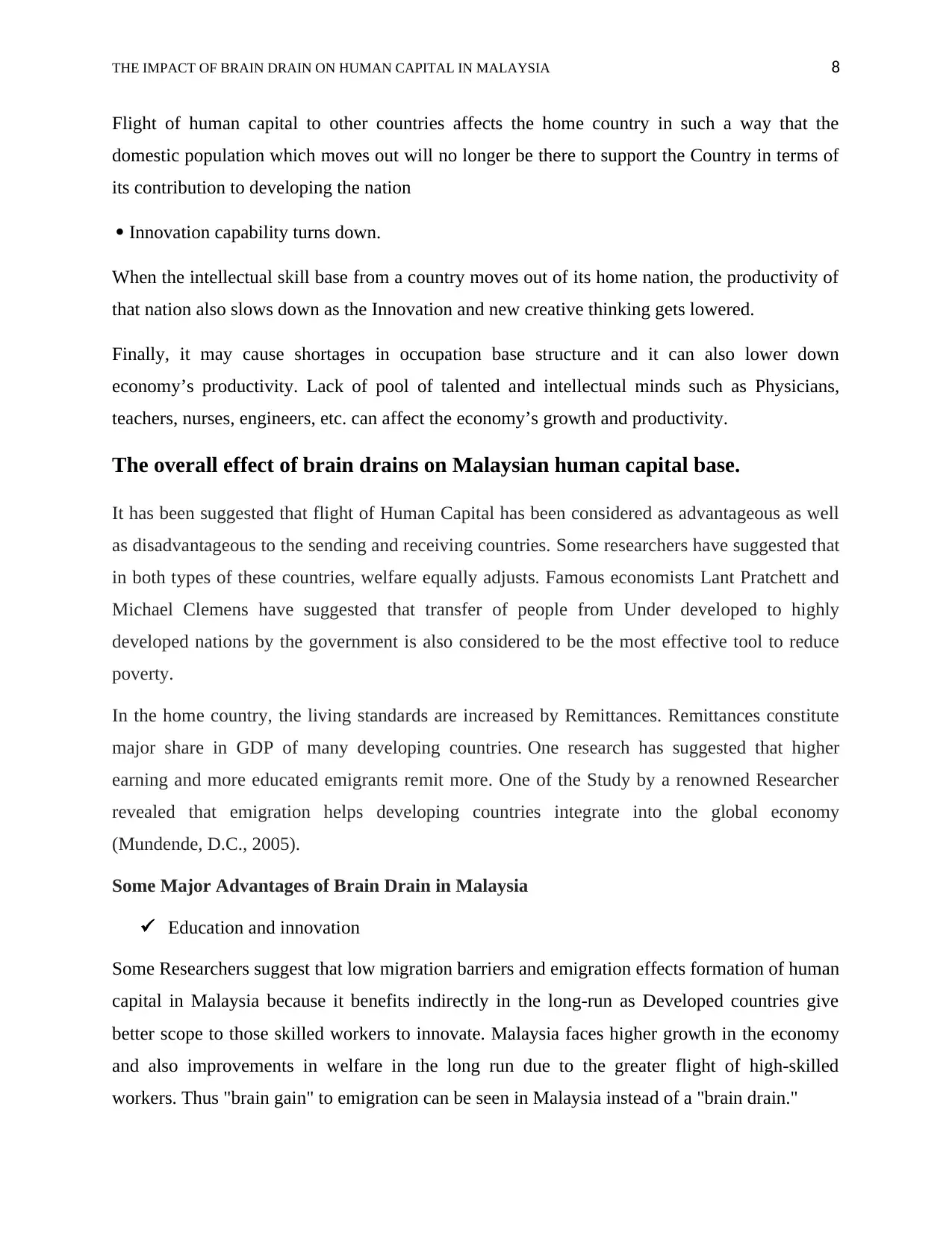
THE IMPACT OF BRAIN DRAIN ON HUMAN CAPITAL IN MALAYSIA 8
Flight of human capital to other countries affects the home country in such a way that the
domestic population which moves out will no longer be there to support the Country in terms of
its contribution to developing the nation
Innovation capability turns down.
When the intellectual skill base from a country moves out of its home nation, the productivity of
that nation also slows down as the Innovation and new creative thinking gets lowered.
Finally, it may cause shortages in occupation base structure and it can also lower down
economy’s productivity. Lack of pool of talented and intellectual minds such as Physicians,
teachers, nurses, engineers, etc. can affect the economy’s growth and productivity.
The overall effect of brain drains on Malaysian human capital base.
It has been suggested that flight of Human Capital has been considered as advantageous as well
as disadvantageous to the sending and receiving countries. Some researchers have suggested that
in both types of these countries, welfare equally adjusts. Famous economists Lant Pratchett and
Michael Clemens have suggested that transfer of people from Under developed to highly
developed nations by the government is also considered to be the most effective tool to reduce
poverty.
In the home country, the living standards are increased by Remittances. Remittances constitute
major share in GDP of many developing countries. One research has suggested that higher
earning and more educated emigrants remit more. One of the Study by a renowned Researcher
revealed that emigration helps developing countries integrate into the global economy
(Mundende, D.C., 2005).
Some Major Advantages of Brain Drain in Malaysia
Education and innovation
Some Researchers suggest that low migration barriers and emigration effects formation of human
capital in Malaysia because it benefits indirectly in the long-run as Developed countries give
better scope to those skilled workers to innovate. Malaysia faces higher growth in the economy
and also improvements in welfare in the long run due to the greater flight of high-skilled
workers. Thus "brain gain" to emigration can be seen in Malaysia instead of a "brain drain."
Flight of human capital to other countries affects the home country in such a way that the
domestic population which moves out will no longer be there to support the Country in terms of
its contribution to developing the nation
Innovation capability turns down.
When the intellectual skill base from a country moves out of its home nation, the productivity of
that nation also slows down as the Innovation and new creative thinking gets lowered.
Finally, it may cause shortages in occupation base structure and it can also lower down
economy’s productivity. Lack of pool of talented and intellectual minds such as Physicians,
teachers, nurses, engineers, etc. can affect the economy’s growth and productivity.
The overall effect of brain drains on Malaysian human capital base.
It has been suggested that flight of Human Capital has been considered as advantageous as well
as disadvantageous to the sending and receiving countries. Some researchers have suggested that
in both types of these countries, welfare equally adjusts. Famous economists Lant Pratchett and
Michael Clemens have suggested that transfer of people from Under developed to highly
developed nations by the government is also considered to be the most effective tool to reduce
poverty.
In the home country, the living standards are increased by Remittances. Remittances constitute
major share in GDP of many developing countries. One research has suggested that higher
earning and more educated emigrants remit more. One of the Study by a renowned Researcher
revealed that emigration helps developing countries integrate into the global economy
(Mundende, D.C., 2005).
Some Major Advantages of Brain Drain in Malaysia
Education and innovation
Some Researchers suggest that low migration barriers and emigration effects formation of human
capital in Malaysia because it benefits indirectly in the long-run as Developed countries give
better scope to those skilled workers to innovate. Malaysia faces higher growth in the economy
and also improvements in welfare in the long run due to the greater flight of high-skilled
workers. Thus "brain gain" to emigration can be seen in Malaysia instead of a "brain drain."
⊘ This is a preview!⊘
Do you want full access?
Subscribe today to unlock all pages.

Trusted by 1+ million students worldwide
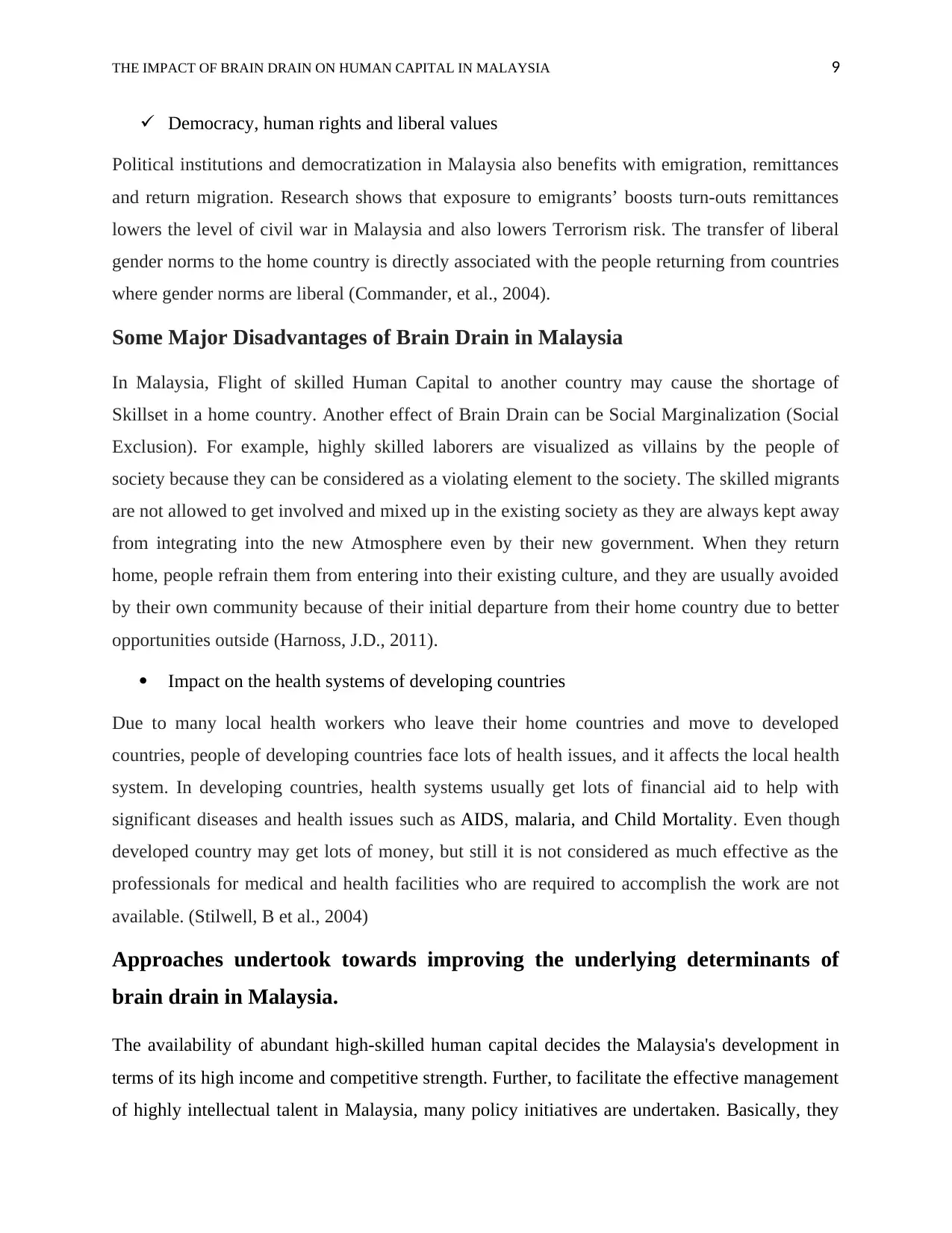
THE IMPACT OF BRAIN DRAIN ON HUMAN CAPITAL IN MALAYSIA 9
Democracy, human rights and liberal values
Political institutions and democratization in Malaysia also benefits with emigration, remittances
and return migration. Research shows that exposure to emigrants’ boosts turn-outs remittances
lowers the level of civil war in Malaysia and also lowers Terrorism risk. The transfer of liberal
gender norms to the home country is directly associated with the people returning from countries
where gender norms are liberal (Commander, et al., 2004).
Some Major Disadvantages of Brain Drain in Malaysia
In Malaysia, Flight of skilled Human Capital to another country may cause the shortage of
Skillset in a home country. Another effect of Brain Drain can be Social Marginalization (Social
Exclusion). For example, highly skilled laborers are visualized as villains by the people of
society because they can be considered as a violating element to the society. The skilled migrants
are not allowed to get involved and mixed up in the existing society as they are always kept away
from integrating into the new Atmosphere even by their new government. When they return
home, people refrain them from entering into their existing culture, and they are usually avoided
by their own community because of their initial departure from their home country due to better
opportunities outside (Harnoss, J.D., 2011).
Impact on the health systems of developing countries
Due to many local health workers who leave their home countries and move to developed
countries, people of developing countries face lots of health issues, and it affects the local health
system. In developing countries, health systems usually get lots of financial aid to help with
significant diseases and health issues such as AIDS, malaria, and Child Mortality. Even though
developed country may get lots of money, but still it is not considered as much effective as the
professionals for medical and health facilities who are required to accomplish the work are not
available. (Stilwell, B et al., 2004)
Approaches undertook towards improving the underlying determinants of
brain drain in Malaysia.
The availability of abundant high-skilled human capital decides the Malaysia's development in
terms of its high income and competitive strength. Further, to facilitate the effective management
of highly intellectual talent in Malaysia, many policy initiatives are undertaken. Basically, they
Democracy, human rights and liberal values
Political institutions and democratization in Malaysia also benefits with emigration, remittances
and return migration. Research shows that exposure to emigrants’ boosts turn-outs remittances
lowers the level of civil war in Malaysia and also lowers Terrorism risk. The transfer of liberal
gender norms to the home country is directly associated with the people returning from countries
where gender norms are liberal (Commander, et al., 2004).
Some Major Disadvantages of Brain Drain in Malaysia
In Malaysia, Flight of skilled Human Capital to another country may cause the shortage of
Skillset in a home country. Another effect of Brain Drain can be Social Marginalization (Social
Exclusion). For example, highly skilled laborers are visualized as villains by the people of
society because they can be considered as a violating element to the society. The skilled migrants
are not allowed to get involved and mixed up in the existing society as they are always kept away
from integrating into the new Atmosphere even by their new government. When they return
home, people refrain them from entering into their existing culture, and they are usually avoided
by their own community because of their initial departure from their home country due to better
opportunities outside (Harnoss, J.D., 2011).
Impact on the health systems of developing countries
Due to many local health workers who leave their home countries and move to developed
countries, people of developing countries face lots of health issues, and it affects the local health
system. In developing countries, health systems usually get lots of financial aid to help with
significant diseases and health issues such as AIDS, malaria, and Child Mortality. Even though
developed country may get lots of money, but still it is not considered as much effective as the
professionals for medical and health facilities who are required to accomplish the work are not
available. (Stilwell, B et al., 2004)
Approaches undertook towards improving the underlying determinants of
brain drain in Malaysia.
The availability of abundant high-skilled human capital decides the Malaysia's development in
terms of its high income and competitive strength. Further, to facilitate the effective management
of highly intellectual talent in Malaysia, many policy initiatives are undertaken. Basically, they
Paraphrase This Document
Need a fresh take? Get an instant paraphrase of this document with our AI Paraphraser
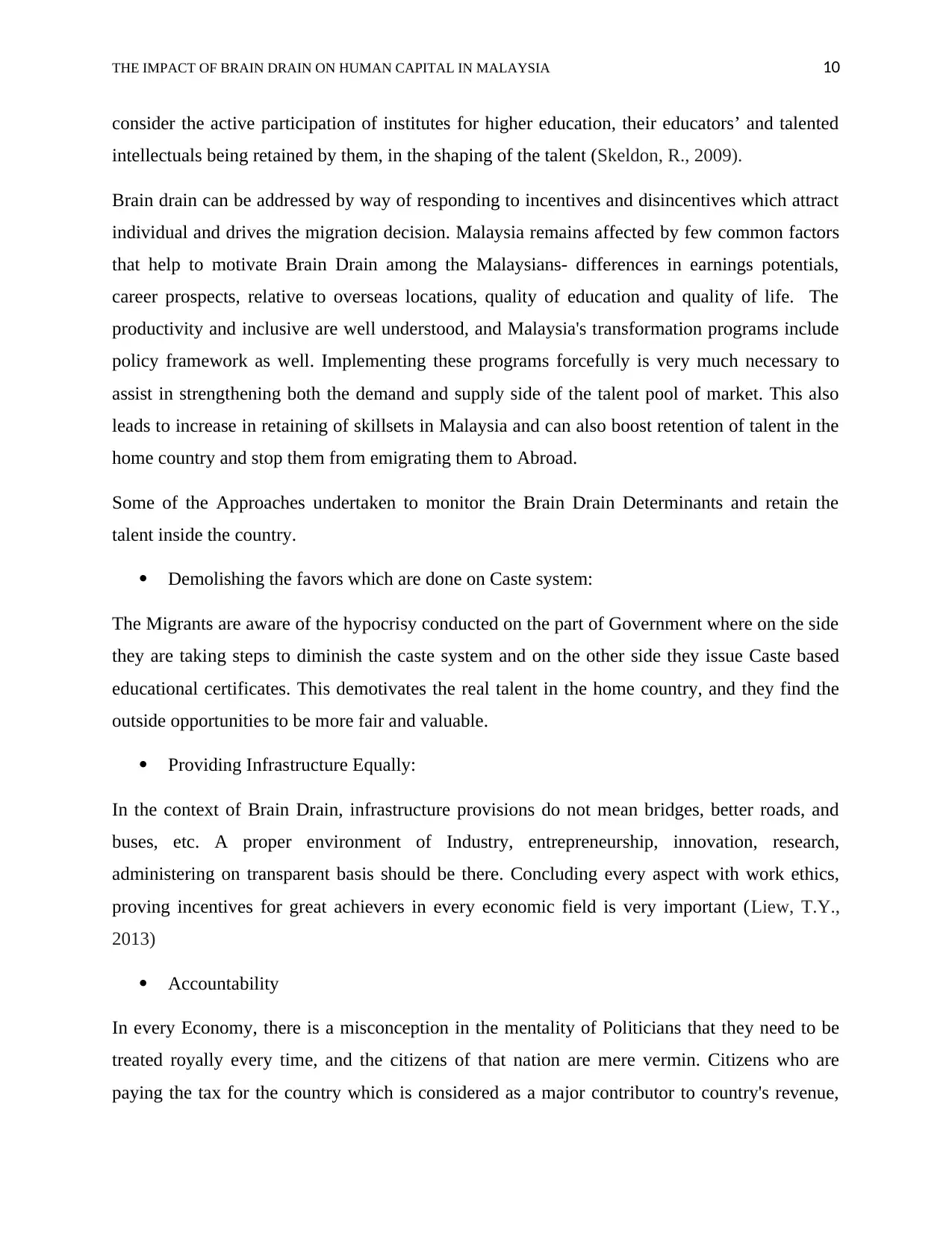
THE IMPACT OF BRAIN DRAIN ON HUMAN CAPITAL IN MALAYSIA 10
consider the active participation of institutes for higher education, their educators’ and talented
intellectuals being retained by them, in the shaping of the talent (Skeldon, R., 2009).
Brain drain can be addressed by way of responding to incentives and disincentives which attract
individual and drives the migration decision. Malaysia remains affected by few common factors
that help to motivate Brain Drain among the Malaysians- differences in earnings potentials,
career prospects, relative to overseas locations, quality of education and quality of life. The
productivity and inclusive are well understood, and Malaysia's transformation programs include
policy framework as well. Implementing these programs forcefully is very much necessary to
assist in strengthening both the demand and supply side of the talent pool of market. This also
leads to increase in retaining of skillsets in Malaysia and can also boost retention of talent in the
home country and stop them from emigrating them to Abroad.
Some of the Approaches undertaken to monitor the Brain Drain Determinants and retain the
talent inside the country.
Demolishing the favors which are done on Caste system:
The Migrants are aware of the hypocrisy conducted on the part of Government where on the side
they are taking steps to diminish the caste system and on the other side they issue Caste based
educational certificates. This demotivates the real talent in the home country, and they find the
outside opportunities to be more fair and valuable.
Providing Infrastructure Equally:
In the context of Brain Drain, infrastructure provisions do not mean bridges, better roads, and
buses, etc. A proper environment of Industry, entrepreneurship, innovation, research,
administering on transparent basis should be there. Concluding every aspect with work ethics,
proving incentives for great achievers in every economic field is very important (Liew, T.Y.,
2013)
Accountability
In every Economy, there is a misconception in the mentality of Politicians that they need to be
treated royally every time, and the citizens of that nation are mere vermin. Citizens who are
paying the tax for the country which is considered as a major contributor to country's revenue,
consider the active participation of institutes for higher education, their educators’ and talented
intellectuals being retained by them, in the shaping of the talent (Skeldon, R., 2009).
Brain drain can be addressed by way of responding to incentives and disincentives which attract
individual and drives the migration decision. Malaysia remains affected by few common factors
that help to motivate Brain Drain among the Malaysians- differences in earnings potentials,
career prospects, relative to overseas locations, quality of education and quality of life. The
productivity and inclusive are well understood, and Malaysia's transformation programs include
policy framework as well. Implementing these programs forcefully is very much necessary to
assist in strengthening both the demand and supply side of the talent pool of market. This also
leads to increase in retaining of skillsets in Malaysia and can also boost retention of talent in the
home country and stop them from emigrating them to Abroad.
Some of the Approaches undertaken to monitor the Brain Drain Determinants and retain the
talent inside the country.
Demolishing the favors which are done on Caste system:
The Migrants are aware of the hypocrisy conducted on the part of Government where on the side
they are taking steps to diminish the caste system and on the other side they issue Caste based
educational certificates. This demotivates the real talent in the home country, and they find the
outside opportunities to be more fair and valuable.
Providing Infrastructure Equally:
In the context of Brain Drain, infrastructure provisions do not mean bridges, better roads, and
buses, etc. A proper environment of Industry, entrepreneurship, innovation, research,
administering on transparent basis should be there. Concluding every aspect with work ethics,
proving incentives for great achievers in every economic field is very important (Liew, T.Y.,
2013)
Accountability
In every Economy, there is a misconception in the mentality of Politicians that they need to be
treated royally every time, and the citizens of that nation are mere vermin. Citizens who are
paying the tax for the country which is considered as a major contributor to country's revenue,
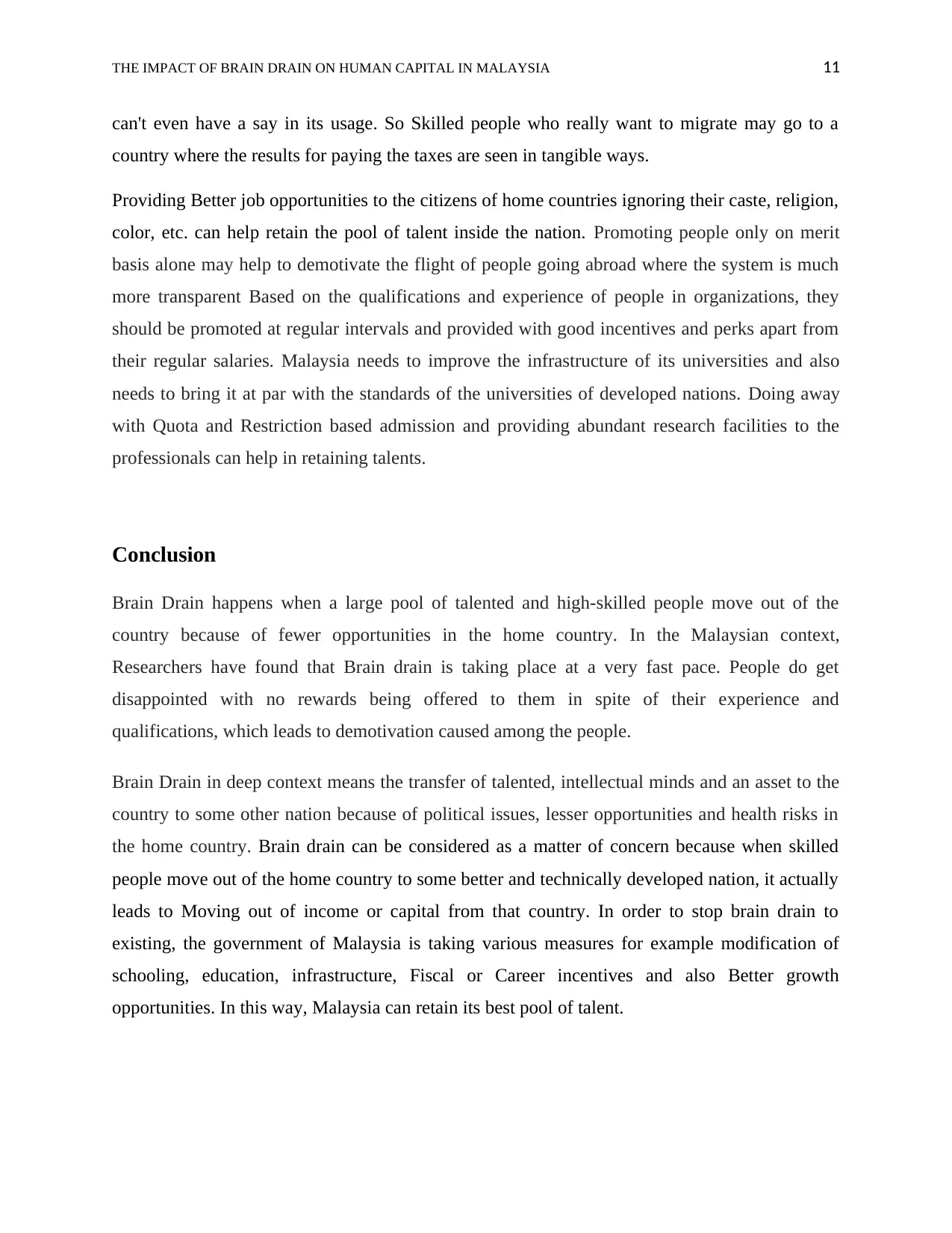
THE IMPACT OF BRAIN DRAIN ON HUMAN CAPITAL IN MALAYSIA 11
can't even have a say in its usage. So Skilled people who really want to migrate may go to a
country where the results for paying the taxes are seen in tangible ways.
Providing Better job opportunities to the citizens of home countries ignoring their caste, religion,
color, etc. can help retain the pool of talent inside the nation. Promoting people only on merit
basis alone may help to demotivate the flight of people going abroad where the system is much
more transparent Based on the qualifications and experience of people in organizations, they
should be promoted at regular intervals and provided with good incentives and perks apart from
their regular salaries. Malaysia needs to improve the infrastructure of its universities and also
needs to bring it at par with the standards of the universities of developed nations. Doing away
with Quota and Restriction based admission and providing abundant research facilities to the
professionals can help in retaining talents.
Conclusion
Brain Drain happens when a large pool of talented and high-skilled people move out of the
country because of fewer opportunities in the home country. In the Malaysian context,
Researchers have found that Brain drain is taking place at a very fast pace. People do get
disappointed with no rewards being offered to them in spite of their experience and
qualifications, which leads to demotivation caused among the people.
Brain Drain in deep context means the transfer of talented, intellectual minds and an asset to the
country to some other nation because of political issues, lesser opportunities and health risks in
the home country. Brain drain can be considered as a matter of concern because when skilled
people move out of the home country to some better and technically developed nation, it actually
leads to Moving out of income or capital from that country. In order to stop brain drain to
existing, the government of Malaysia is taking various measures for example modification of
schooling, education, infrastructure, Fiscal or Career incentives and also Better growth
opportunities. In this way, Malaysia can retain its best pool of talent.
can't even have a say in its usage. So Skilled people who really want to migrate may go to a
country where the results for paying the taxes are seen in tangible ways.
Providing Better job opportunities to the citizens of home countries ignoring their caste, religion,
color, etc. can help retain the pool of talent inside the nation. Promoting people only on merit
basis alone may help to demotivate the flight of people going abroad where the system is much
more transparent Based on the qualifications and experience of people in organizations, they
should be promoted at regular intervals and provided with good incentives and perks apart from
their regular salaries. Malaysia needs to improve the infrastructure of its universities and also
needs to bring it at par with the standards of the universities of developed nations. Doing away
with Quota and Restriction based admission and providing abundant research facilities to the
professionals can help in retaining talents.
Conclusion
Brain Drain happens when a large pool of talented and high-skilled people move out of the
country because of fewer opportunities in the home country. In the Malaysian context,
Researchers have found that Brain drain is taking place at a very fast pace. People do get
disappointed with no rewards being offered to them in spite of their experience and
qualifications, which leads to demotivation caused among the people.
Brain Drain in deep context means the transfer of talented, intellectual minds and an asset to the
country to some other nation because of political issues, lesser opportunities and health risks in
the home country. Brain drain can be considered as a matter of concern because when skilled
people move out of the home country to some better and technically developed nation, it actually
leads to Moving out of income or capital from that country. In order to stop brain drain to
existing, the government of Malaysia is taking various measures for example modification of
schooling, education, infrastructure, Fiscal or Career incentives and also Better growth
opportunities. In this way, Malaysia can retain its best pool of talent.
⊘ This is a preview!⊘
Do you want full access?
Subscribe today to unlock all pages.

Trusted by 1+ million students worldwide
1 out of 13
Your All-in-One AI-Powered Toolkit for Academic Success.
+13062052269
info@desklib.com
Available 24*7 on WhatsApp / Email
![[object Object]](/_next/static/media/star-bottom.7253800d.svg)
Unlock your academic potential
Copyright © 2020–2025 A2Z Services. All Rights Reserved. Developed and managed by ZUCOL.